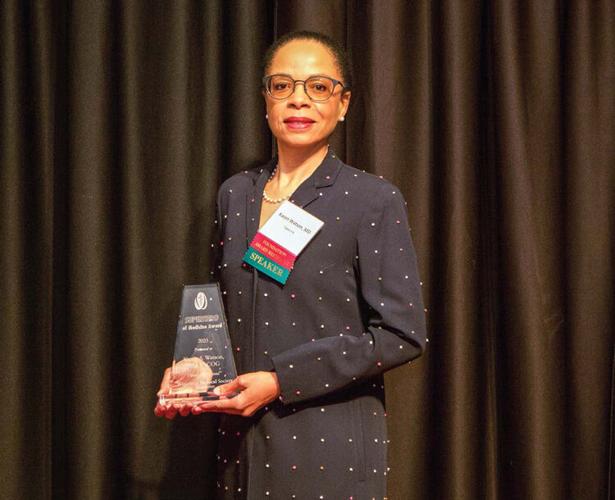
Ever since she was a child, Karen S. Watson, MD, OB/GYN at Ascension Wisconsin, has loved math and science. Those interests led her down a path where today she thrives as a board-certified OB/GYN at Ascension St. Joseph in Milwaukee, passionately working to improve women’s health care.
“I’m deeply committed to supporting our most vulnerable populations and eliminating the health equity gaps in our community,” Dr. Watson says. “I wanted to fill a need I saw lacking for women, particularly in Milwaukee. There are very few Black, board-certified OB/GYNs in Milwaukee. Maternal and infant mortality rates are too high and, according to the CDC, are not getting better.”
In April, the Wisconsin Medical Society Foundation honored Dr. Watson with the Superhero of Medicine award during its annual dinner in Madison. The annual award recognizes physicians who go above and beyond the call of duty to improve the health of their community.
“Our organization, her patients and our community are blessed to have such a devoted physician who has dedicated her life to caring for others, especially those who need her most,” said Ascension Senior Vice President and Ministry Market Executive Bernie Sherry.
Wisconsin Medical Society President-Elect Don Lee, MD, noted examples such as her championing of Blanket of Love, a social-support program that helps expectant mothers and families from pregnancy to beyond their baby’s first birthday; her efforts that led to a reduction of primary c-sections reducing complications, injuries and deaths; and her generosity in sharing her time and expertise with providers across the state to improve the care and treatment of OB/GYN patients.
Change Through Leadership
Ascension has several initiatives dedicated to improving women’s health, health care access and outcomes. Dr. Watson is especially proud of Ascension’s overall high standard of care to decrease maternal morbidity from factors like hypertension, preeclampsia and infections.
“An important part of this work are our prenatal care coordinators [PNCs] who work with women to make sure they're getting the care they need and eliminate barriers to care,” she says.
One specific initiative Dr. Watson addresses is the Maternal Health Social Systems Initiative, launched at Ascension St. Joseph Hospital in 2019. After noticing the wide disparities in maternal health in Milwaukee and across the county, the program was launched to help expectant and new mothers get to their appointments and ensuring they have access to timely care.
“The initiative identified what systemic social barriers expectant women face when it comes to getting to their prenatal appointments,” Dr. Watson explains. “The framework is simple and unconventional. It prioritizes listening to, and then organizing, learnings from the individuals to determine the best approach to care. We learned directly from patients what was preventing them from getting to their appointments, such as lack of child care and transportation.”
Ascension St. Joseph now has a child waiting area where nursing students watch children of expectant and new mothers while they get the care they need, she says. And after a successful trial period at Milwaukee’s Ascension St. Joseph Hospital, the Maternal Health Social Systems Initiative was also implemented in other Ascension hospitals in Florida, Michigan and Kansas.
Support For Pregnant Women
Another important factor for pregnant women is nutrition and nutritional support and education for pregnant women who are at an increased risk for anemia, gestational diabetes and hypertensive disorders, Dr. Watson says. Mismanaging these conditions can lead to an increased risk in maternal health and pregnancy outcomes, proving the importance of nutrition education and counseling, especially when combined.
“That pairing of nutritional support and education led our team to develop diagnosis-specific food bags that are initiated by prescription and then dispensed through its pharmacy,” Dr. Watson explains. “The bags contain not only the food, but also recipes and educational materials. The food bags provide concrete examples of good nutritional choices for patients who can then make better purchasing decisions at grocery stores.”
She notes that the bags give patients the opportunity to try foods they may have not considered before or have been unable to try due to finances. “Patients may discover that they and their families like these choices and choose them again, resulting in healthier patterns of nutrition,” she says.
Another goal is treating women with iron deficiency anemia, working to get their hemoglobin levels back to normal by delivery to reduce morbidity rates, Dr. Watson says.
“A normal hemoglobin level allows the patient to tolerate a normal amount of blood loss and to have the energy to interact with and care for her newborn,” she says. “The Maternal Health Social Systems team provides navigation assistance to help break down barriers to access this care. Both the diagnosis-specific food bags and the increase in IV iron infusions are making a positive impact on our patients.”

More Care For At-Risk Moms
Dr. Watson passionately works to provide care to her patients and to help decrease mortality rates, which she says are currently at crisis level in the United States.
“Despite advances in medicine and the presence of vast health care resources, women in the U.S. are more likely to die from complications from pregnancy or childbirth than women in similarly developed nations,” Dr. Watson says. “Expectant women in the U.S. face some of the highest severe maternal morbidities [SMM] rates compared with other developed countries. And SMM rates for Black non-Hispanic women are almost three times higher than those for white women.”
According to the Wisconsin Department of Health Services, preterm birth (birth before 37 weeks gestation) is a leading driver of neonatal death, she says. “And the rate of neonatal deaths due to preterm birth is 21 percent higher in Wisconsin than the nation as a whole — one of the highest in the nation,” she continues. “Wisconsin’s Black infant death rate is three times that of the white rate. The majority of Wisconsin infant deaths occur in the Milwaukee central city and can be attributed to complications related to prematurity — delivery before 37 weeks of pregnancy.
“Wisconsin has a long history of health inequities in infant mortality with no consistent improvement over the past few decades.”
Another priority for Dr. Watson on her mission for better maternal and infant care is a dedication to decrease c-sections as much as is possible.
“African American women have a higher c-section rate than other women — more than 30 percent nationally, on average,” she says. “Ascension’s goal for first-time moms is less than 22 percent. St. Joe’s is less than 21 percent, and well below the benchmark set by Health and Human Services for the maximum number of c-sections for first-time moms.
“This is important, because c-sections can lead to higher morbidity due to increased risk of infection and bleeding and an increased risk of a second c-section,” she explains.
In an effort to increase education and create community, Dr. Watson has also been a champion for Blanket of Love. In collaboration with churches, city officials, homeless shelters, neighborhood centers and community partners, this educational and social-support program helps expectant mothers and their families from the early stages of pregnancy into their child’s early years. The program meets monthly at churches in the Milwaukee area and has grown to include 36 churches, three Ascension Wisconsin hospital campuses and Meta House.
“Each year, more than 5,200 families receive educational, social and healthcare resources through Ascension Wisconsin Blanket of Love,” Dr. Watson says.
A Healthcare Superhero
It’s clear that Dr. Watson cares deeply about her patients and her MKE community.
“I practice in the same hospital where I was born,” Dr. Watson says. “I’m deeply committed to Ascension St. Joseph and the neighborhood that surrounds it. I still feel joy in the work I do and the patients I can help. While my work can be challenging, it’s also very rewarding.”
And the Superhero of Medicine recognition was somewhat of a shock to her, she says. “After 28 years of practice, it was unexpected and very heartwarming to be recognized by my peers for my contributions to obstetrics and gynecology in Milwaukee, in particular on the north side,” Dr. Watson says. “I was humbled and deeply appreciative.”
The demands of the medical field can be tiring, so Dr. Watson notes that she makes sure to take care of herself just as much so she can be in her top form for patients.
“I have a demanding job, and the way I deal with that is by making health and nutrition a priority in my life,” she says. “I also make sure I have plenty of outlets to relieve stress including physical fitness activities like martial arts, yoga, skiing and cycling. I also enjoy traveling extensively and music — I play the piano and guitar.”
For those considering a career in maternal medicine, she offers some words of wisdom.
“This is not a field to go into for the money,” she says. “This has to be more of a calling, because it can be demanding and tiring. Many patients are sicker than they used to be. Maternal mortality is increasing. You need to be someone who is dedicated to improving women’s health.
“I would encourage anyone who is passionate about women’s health to study hard and go to school to be an OB/GYN, because while it can be challenging, it’s also very rewarding to be able to make a positive impact on your patients and their families.” MKE


